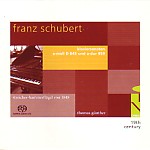For this recording of Schubert’s A minor D. 845 and A major D. 959 sonatas Thomas Günther employs a Viennese fortepiano made by the firm J. B. Streicher circa 1848. It’s not strictly a period instrument insofar as it dates from 20 years after Schubert’s death. Yet the “nasalness” and marked registral differentiation characterizing the instrument’s full-bodied timbre (abetted by Cybele’s seductively three-dimensional surround sound) suit both the music’s unforced lyrical inspiration and oddball harmonic diversions.
In the A minor, Günther’s forthright, straightforward, and sober style proves easier to respect than to love. While he allows himself enough rhythmic leeway to nudge along the lengthy first two movements, the results don’t compel to the same degree as Andreas Staier’s more angular, colorful, and impetuous fortepiano interpretation. The Scherzo’s jagged main theme and quirky silences also could benefit from a lighter touch and more nervous energy. However, Günther takes his time over and gives cogent melodic shape to the Allegro vivace’s toccata-like patterns.
Günther fares best in the A major sonata’s fastidiously-executed first and third movements. By contrast, he pulls back when the Andantino’s anguished chromatic runs and trills beg the pianist to spill out his or her guts. The gloriously tuneful finale needs the kind of singing impulse you hear from Paul Badura-Skoda’s less technically polished fortepiano traversal, in contrast to Günther’s more accomplished yet foursquare pianism. Günther contributes booklet notes that discuss at length his involvement with period instruments and offer his enthusiastic and insightful responses to the works he plays.
































